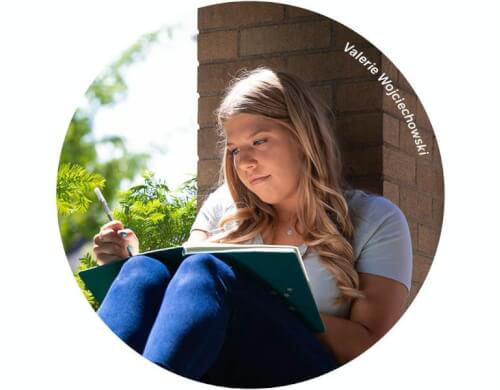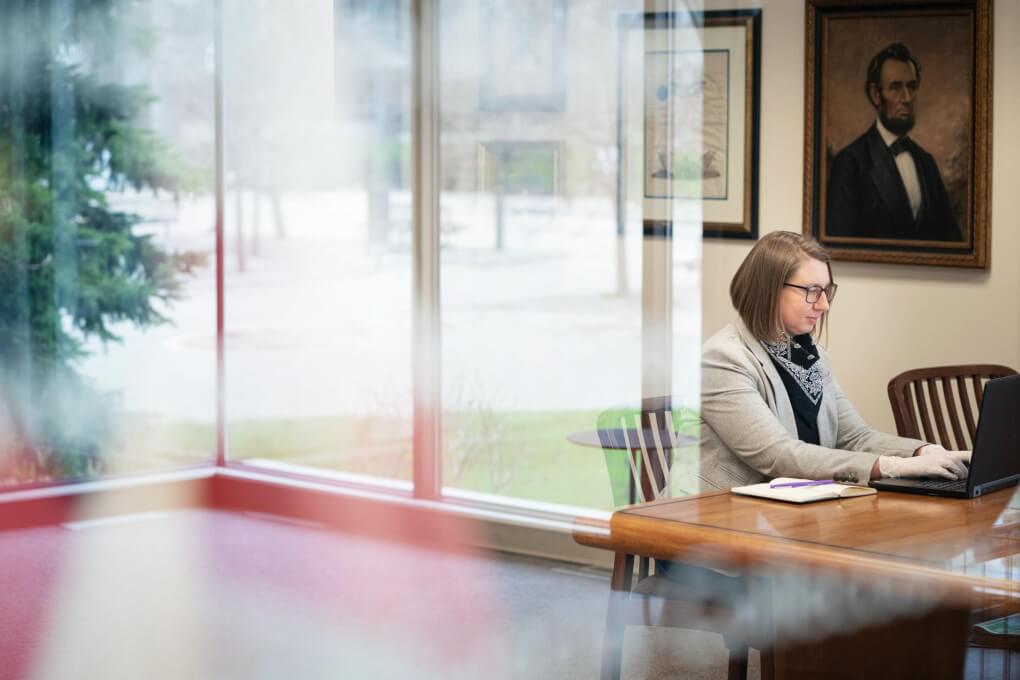The way we currently livehas been transformed by the COVID-19 pandemic, and our present reality will be examined by historians for many years to come. Special Collections & University Archives is leading the way to document the personal experiences of the Grand Valley community during this historic time.
The COVID-19 journaling project aims to collect journals from faculty, staff and students. This project was spearheaded by Annie Benefiel, university archivist and digital collections librarian.
Benefiel said the main goal of the project is to collect journals for future generations to study in order to better understand the impacts of the COVID-19 pandemic on a more individual level.
Natalie Loewengruber, a graduate student majoring in occupational therapy, heard about the project through her job as a research consultant in the library. It immediately piqued her interest and she volunteered to contribute.
“It’s a personal experience that doesn’t always get recorded in the history books, but it connects you to the human side of history.”
Annie Benefiel, university archivist and digital collections librarian (pictured above)
Loewengruber maintained a fairly positive attitude while sheltering in place with her roommates, and credited consistent journaling with aiding her mental health. “Just having a place to articulate and process what’s been going on has been helpful,” Loewengruber said.
Despite an abrupt shift to remote learning in March, Loewengruber said faculty members in the Occupational Science and Therapy Program were a strong support system.
“When we didn’t really know what was going on at the beginning, they were sending updates seeing if we were OK mentally and if we were safe, plus helping us stay on track with our assignments,” Loewengruber said. “They really made themselves available and made it evident that they value our well-being.”
Before COVID-19, Ryan Elliott, another student contributing to the journaling project, was preparing for his life after college. Elliott received an offer for a full-time position as a controls engineer in early spring and was preparing to marry his fiancée, Shea, in May. However, things didn’t go quite as Elliott had planned.
In Elliott’s video journals, he recounts the difficult decision he and his fiancée made to shift their wedding plans. Originally, they were to wed in front of 200 guests at a golf course in Lansing, but ended up getting married in a family member’s back yard in front of a much smaller group of attendees in late May.
They had briefly considered postponing their wedding but didn’t want to wait any longer, he said, having already been engaged for two years. “As the virus got more serious, I found myself caring less about what each day looked like, and more about getting married to Shea,” Elliott said.
As an archivist, Benefiel said she gets excited about the prospect of curating these intimate accounts of historical events.
“Some of our favorite collections in our archives are letters from World War II soldiers to their girlfriends,” Benefiel said. “Similar to what we are doing now, it’s a personal experience that doesn’t always get recorded in the history books, but it connects you to the human side of history.”
When historians study these journals many years into the future, Loewengruber said she hopes the collection expresses how, in the face of a life-changing event, “the fundamentals of humanity didn’t change. We still found ways to connect and support each other.”

Exerpts from the COVID-19 Journaling Project
“Nearly every day over the last month has been an emotional rollercoaster, fluctuating sometimes hourly between feelings of helplessness, depression, gratitude, peace and hopefulness.”
Natalie Loewengruber, April 11, 2020 (pictured above)
“These are wild, unprecedented times, but I am seeing that when the whole world has stopped, all that’s left is the people. We are all alone together, and we will get through it together.”
Natalie Loewengruber, April 11 2020
“2020 was going to be the big year. Graduation, marriage, starting a career. But unfortunately things aren’t what we thought they were going to be. Which is OK, but it can be frustrating.”
Ryan Elliott, April 2, 2020
“I look forward to the day that we can get back to everyday life, but I do hope that we can take what we have learned from this experience and live differently.”
Katelyn Anthony, April 20, 2020
“I must keep reminding myself that this is uncharted territory, and nobody knows what to expect. And again, we’re all in this together, nobody stands alone.”
Ashlyn Dunham, April 21, 2020
“I think it is safe to assume that most people I know feel like the month of March actually had 62 days.”
José Garcia, April 2, 2020







